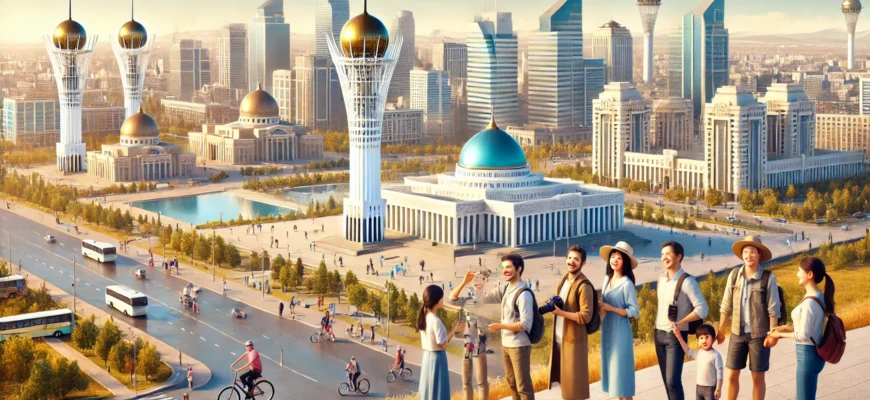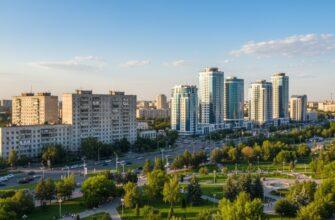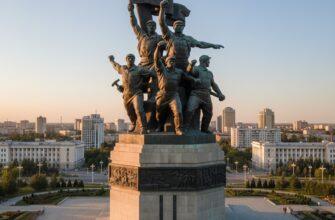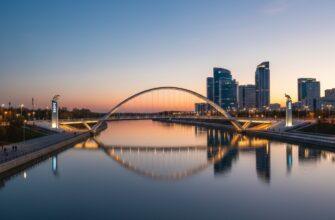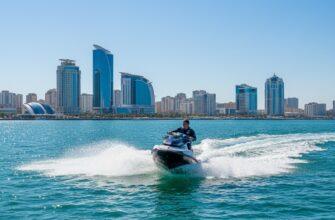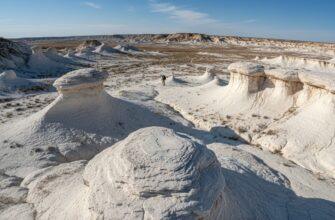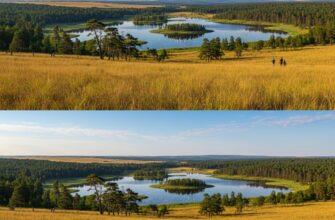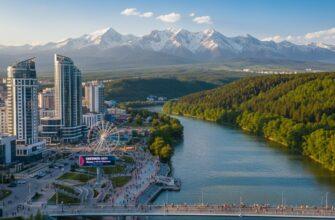Is Kazakhstan Safe for Foreign Visitors?

Key Highlights
- Kazakhstan is generally a safe country for travelers, with a Level 1 safety rating from the US Department of State.
- Petty crime exists but is relatively rare, and violent crime against foreigners is uncommon.
- Transportation safety varies; roads can be dangerous, and police corruption is a concern for drivers.
- Healthcare standards are lower than in Western countries, so comprehensive travel insurance is crucial.
- While experiencing political unrest is uncommon, it’s important to stay informed and avoid demonstrations.
Introduction
Kazakhstan is located in Central Asia. It is a place that makes many people curious and, for a few, a bit worried about safety. The country has wide steppes, modern cities, and friendly people, including its main cities. It truly has much to give to visitors. But, how safe is Kazakhstan? This guide will share important tips and information for travelers. It uses advice from the Kazakh authorities to help ensure a safe and fun trip through Kazakhstan in 2024.
Understanding Safety in Kazakhstan

Kazakhstan often surprises visitors with its tourist safety. Even with the “Stans” label, the country is mostly peaceful and is growing its tourism industry. But just like any place, it is important to know the possible risks and take the right steps to stay safe.
From small theft to road safety and political issues, being ready helps ensure a better, safer, and more fun experience. So, how safe is Kazakhstan? Let’s look at the safety and security details visitors should know.
Country Overview and Safety Index
Kazakhstan has a low crime rate, especially in big cities like Astana and Almaty. The 2024 Global Peace Index shows that Kazakhstan is a peaceful nation. This idea is supported by the US Department of State’s Level 1 travel advisory, which encourages visitors to take normal safety steps.
Still, don’t let this good news make you careless. Petty crimes, like pickpocketing, can happen, especially in busy places or tourist spots in big cities. While rural areas are mostly safe, the distance can make some things tough, like a lack of communication and emergency services.
It’s a good idea to pay attention to your surroundings, keep your belongings safe, and stay aware. Before you go out, especially to distant areas, let someone know your plans and when you expect to be back.
Common Concerns for Foreign Visitors
While violent crime against tourists is rare, petty crime like theft can happen, so stay alert. Pickpockets might target crowded places like markets and public transportation. Protect your personal belongings, especially in busy tourist spots.
Another concern is drink spiking, which can lead to sexual assault. Though it doesn’t happen often, it’s smart to be careful, especially in bars and nightclubs. Don’t leave your drink alone and be careful when accepting drinks from new people.
When you are out exploring cities or using public transportation, especially at night, pay attention to what is around you. Choose well-lit streets and areas where there are lots of people.
Navigating Safety Challenges
While Kazakhstan is usually safe, travelers should be careful in certain situations. Knowing about these issues and taking steps to avoid them can help reduce risks and make your trip enjoyable.
These issues can include petty crime, scams, and problems with road safety, plus being aware of local customs. Being informed and prepared can help you handle these challenges. It will let you enjoy everything that Kazakhstan offers.
Crime Rates and Types of Crimes
Kazakhstan has a low overall crime rate. However, there is some petty crime, especially in cities. Tourists should be careful about pickpocketing, purse snatching, bag snatching, and scams. Be careful of people who approach you with offers for help, tours, or currency exchange at very high rates.
Meeting dishonest police officers isn’t very common now, but be ready to stand up for your rights in a calm way. If a police officer stops you, ask why and ask to see their identification. Remember, bribing is against the law and offering a bribe can make things worse.
Public protests don’t happen often, but they can take place. It’s best to stay away from large gatherings because things can get out of hand. Keep up with local news and follow the instructions of local authorities to pay attention to any warnings from your embassy.
Areas to Avoid for Tourists
Most tourist spots in Kazakhstan are a safe place. Still, it’s good to be careful in some situations. When you use public transport, keep an eye on your belongings, mainly when it is busy.
The Almaty region is usually safe, which includes the city and its nearby mountains. However, it’s not a good idea to explore remote areas alone. Always stay on marked paths. Make sure to tell someone where you are going and when you plan to come back.
In border areas, especially near China and Kyrgyzstan, security can be tight. You may need to contact the Ministry of Internal Affairs for special permits to go through. Check the current rules and updates before you travel to these spots.
Tips for Personal Safety
Ensuring your safety in Kazakhstan means using common sense and respecting local customs. Start by getting good travel insurance. This should cover medical emergencies, evacuation, and theft.
Always stay aware of your surroundings, especially in busy areas. Keep your belongings safe and don’t show large amounts of cash. When you go out, carry a copy of your passport and visa. Keep the originals safe at where you are staying.
Know the basic local laws and customs. Dress appropriately, especially when visiting places of worship. Public intoxication is not accepted, and having illegal drugs can lead to serious troubles.
Terrorism and Political Stability

Kazakhstan is usually seen as a politically stable country. However, it’s important to know about possible risks and stay updated on the political situation. The Kazakh authorities have managed terrorist threats well. Still, it is good to stay alert.
Like in any other place around the world, there can be some unrest. It’s a smart idea to check local news and follow travel advice from your embassy or consulate.
Recent Incidents and Government Response
Kazakhstan has seen public protests in recent years. These were mainly about economic issues. While these protests do not target tourists directly, they can grow quickly. The Kazakh authorities work hard to keep order and ensure safety.
Terrorist attacks in Kazakhstan are uncommon. Still, we know such attacks can happen anywhere in the world, especially in public places. The government has set up security measures. They also work with other countries to handle any possible threats.
It’s smart to stay updated by checking local news regarding international travel. You can also subscribe to alerts from your embassy. Register your travel plans with the authorities of your home country. Be ready to change your travel plans if needed.
Advice for Staying Safe During Political Unrest
In case there is political unrest, your safety should come first. Stay updated about what is happening. Check local news, the website of your country’s Department of State, and social media for the latest news and advice.
Avoid places where protests or gatherings are happening. Do not take part in any of these events. Tensions can rise fast, and even peaceful protests can become dangerous.
Always listen to the instructions from local authorities. They know the best information during these times. If they tell you to stay inside, do not go out until it is safe.
Health and Medical Preparedness

Taking care of your health is very important when you travel in Kazakhstan. The country does not have big health risks, but it is still good to be careful so you can have a healthy visit.
You should pack a good medical kit. Pay attention to tips about food and water safety. It is also important to know how the healthcare system works and seek additional information on healthcare protocols. Being proactive can help you avoid health problems.
Vaccinations and Health Advisories
No specific vaccines are required to enter Kazakhstan. However, it is best to be up-to-date on common vaccines like Hepatitis A, Typhoid, and Tetanus, especially considering the high risk of diseases. Check with your doctor for health advice based on your medical history and travel plans.
If you are coming from a country where there is a risk of yellow fever, you may need to show proof of a yellow fever vaccination. Make sure to check your country’s travel advisories or contact the nearest Kazakh embassy or consulate for the latest information on vaccine rules.
It’s smart to bring a basic medical kit. Your kit should include essential medicines, antiseptic wipes, bandages, and any personal prescriptions. You should also prepare for stomach issues by including over-the-counter treatments for diarrhea and indigestion.
Accessing Healthcare in Kazakhstan
Kazakhstan’s healthcare system is quite different from what you may know in Western countries. Major cities like Astana and Almaty have good medical facilities and qualified doctors. However, healthcare in rural areas can be lackluster compared to the modern health care services found in urban settings.
You may find it hard to locate English-speaking medical professionals outside the big cities. If you have specific health needs, including issues related to tick bites, bring enough prescription medication for your entire trip because finding certain medicines locally may be tough.
Think about getting travel insurance that includes coverage for medical emergencies and evacuation. Healthcare in Kazakhstan is usually affordable, but for certain specialized treatments, you might need to pay upfront.
Dealing with Emergencies and Hospitals
In a medical emergency, call 112. This is the national emergency number for Kazakhstan. Be ready to share where you are and what the emergency is like. Remember, ambulance response times may be longer in rural areas.
Kazakhstan does have hospitals, but the quality of medical treatment may be different from what you expect in Western countries. If you need serious medical care, you may need to be medically evacuated to your home country or to a nearby country that has better healthcare.
Make sure your travel insurance covers medical evacuation. Keep important contact information close by. This should include your embassy or consulate’s information, local emergency numbers, and your insurance company’s contact details.
Legal and Cultural Considerations

Respecting local laws and customs is very important for a safe and fun trip in Kazakhstan. The country is open to tourists, but being aware of the local culture helps make a good experience for both visitors and locals.
Make sure to learn about basic legal rules, dress codes, social manners, and cultural feelings.
Laws Tourists Should Be Aware Of
Kazakhstan has strict traffic laws. If you want to drive there, you need to know the rules. Always bring your international driving permit, your insurance papers, and your passport. Seatbelts are a must for everyone in the car. Also, it’s illegal to use a mobile phone while driving.
Kazakhstan does not allow illegal drugs at all. If you are caught with, using, or selling narcotics, you will face serious penalties. This includes long prison sentences and heavy fines. Even having a small amount can get you into big trouble.
You should not take photos or videos of official buildings, military installations, or other sensitive places. It’s really important to respect these rules. If you’re not sure about something, it’s best to ask for help.
Cultural Norms and Etiquette for Visitors
Understanding and respecting local customs and traditions is important for a great travel experience in Kazakhstan. Dress appropriately, especially when visiting religious sites. Remember to take off your shoes when you enter someone’s home.
The local money is the Kazakh Tenge (KZT). In big cities, credit cards are accepted in large shops and restaurants. However, it’s a good idea to carry some cash, especially in smaller towns or rural areas.
When you visit someone’s home, it’s polite to bring a gift. Small acts of respect and gratitude can help create good relationships with local people.
LGBTQ+ Traveler Information
While there are no laws against LGBTQ+ people in Kazakhstan, showing affection in public may not be welcomed. It’s a good idea to learn about the local cultural views on LGBTQ+ topics.
You might face verbal abuse or discrimination because of your sexual orientation or gender identity. Still, open hostility toward foreigners is not common. If you do face harassment, it’s best to report it to the local authorities.
Many online resources and LGBTQ+ groups offer cultural insights and support for travelers going to Kazakhstan. Looking into these resources can help you navigate safely and enjoy your trip more.
Transportation and Mobility

Getting around Kazakhstan has different options, and each one has its own points to think about. You can take long road trips across wide steppes or drive through busy city streets. Knowing how to use transportation will help you travel better.
Public transport is a cheap and easy way to move around in cities. But if you plan to go outside the cities, you might need to rent a car.
Safety of Public Transportation
Public transportation in Kazakhstan’s cities is usually safe, efficient, and cheap. You can rely on buses, trolleybuses, and metro systems for easy travel. However, be careful of pickpockets in crowded places.
Marshutkas, which are minibuses run by private operators, are common in Kazakhstan. They are handy but sometimes known for bad driving. If you ride in a marshrutka, be ready for a rough trip and remind drivers to follow traffic laws.
Keep in mind that traffic laws may not always be followed closely. It’s important to stay safe whether you drive or ride. Always look both ways before crossing the street, as pedestrians might not have the right of way.
Renting Cars and Driving Regulations
Having your own car lets you explore Kazakhstan more easily. This is especially great for visiting remote places. But if you choose to rent a car, there are some things to think about. This mainly includes the road conditions and dealing with police.
You need an international driving permit to drive in Kazakhstan. Make sure to get one before your trip. Also, know that roads outside major cities can be tricky, with the huge distance between gas stations. You might find potholes, uneven surfaces, gravel roads, and not much signage.
When you rent a car, be sure to choose well-known rental companies. Check if the vehicle is in good condition and look for any damage before you start driving. It’s also important to know the local traffic laws, especially if you are traveling in areas where fuel shortages might occur.
Best Practices for Pedestrians
Pedestrian safety in Kazakhstan needs careful attention, especially in busy urban areas. Crosswalks are there, but drivers don’t always stop for walkers. Always be careful before you cross the street. Try to make eye contact with drivers to make sure they see you.
Pay attention to your surroundings. Don’t get distracted by your phone when you cross streets. Sidewalks may not be in good shape, so look out for potholes, bumps, and other things that could trip you.
If you walk at night, stay in well-lit and busy places. You might want to carry a small flashlight, especially in neighborhoods with little lighting.
Communication and Emergency Assistance

Staying connected is very important for having a safe and easy travel experience in Kazakhstan. You need to access local information and keep in touch with family and friends. Reliable ways to communicate are key.
Whether you use mobile data, local SIM cards, or Wi-Fi, it is essential to know how to connect.
Keeping in Touch and Mobile Connectivity
Mobile connectivity in Kazakhstan is quite good, especially in major cities. You can buy local SIM cards from providers like Beeline, Tele2, or Aktiv when you arrive at the airport or in the city centers. These SIM cards have cheap data packages, so you can stay connected while on the move.
Many hotels, restaurants, and cafes in Kazakhstan offer free Wi-Fi. This lets you check emails, update your social media, and stay in touch with family and friends at home.
Local media sources, such as newspapers, television, and radio stations, share useful news about events and local life. Most of this information is in Russian or Kazakh, but some English-language resources are available online and in major cities.
Consular Services for US Citizens
US citizens who travel to Kazakhstan should register with the nearest US embassy or consulate as soon as they arrive to protect against potential issues related to international child abduction. This helps the embassy help you better if there’s an emergency, like a natural disaster or civil unrest.
The US Department of State has useful travel information and warnings about Kazakhstan on its website. It’s a good idea to check this site before and during your trip to know about any safety or security issues.
If you lose your passport or it gets stolen, contact the US embassy or consulate right away. They will help you start the process of getting a new one. They can guide you through the steps, give you temporary travel documents, and help with any other consular service you may need.
Conclusion
When visiting Kazakhstan, it’s important to think about safety. You should know about the country’s safety measures, including the country security report, and possible risks. Staying informed, following tips to be safe, and knowing local laws can help you enjoy your trip more. Keep emergency numbers close, communicate well, and focus on your well-being while you explore this beautiful place. Remember, being prepared is very important for a safe and fun visit to Kazakhstan. Safe travels!
Frequently Asked Questions
What are the emergency numbers in Kazakhstan?
In an emergency in Kazakhstan, call 112. This is the national emergency hotline. When you call this number, you can reach the police, fire services, and medical help. They can respond quickly to your needs.
How do I deal with language barriers?
- Download translation apps and learn some basic Russian phrases to help with language issues.
- Carry a phrasebook or use online translation tools.
- Make sure to keep your travel documents and personal data safe.
- Avoid sharing sensitive information with strangers.
Is tap water safe to drink in Kazakhstan?
It’s best to stay away from tap water in Kazakhstan. Instead, choose bottled water. You can easily find it in stores and restaurants. This choice helps reduce the chance of stomach problems and makes your trip healthier.
Can I use my credit cards widely?
Credit cards are accepted in major cities. You can use them in shopping areas, hotels, and well-known restaurants. However, it is a good idea to carry some local money. In rural areas, like small shops or for smaller transactions, having Kazakh Tenge can be helpful.
What should I do if I lose my passport?
If you lose your passport, tell the local authorities right away. You will need a police report. After that, reach out to the nearest embassy or consulate of your country for guidance on entry requirements. They can help you get emergency travel documents and give you advice on what to do next.
Preparing for Your Trip
Before you start your trip to Kazakhstan, it’s important to be prepared. First, check the visa requirements for the purpose of your travel. If you are a US citizen, you can visit without a visa for up to 30 days. However, make sure to verify if there are any updates as your travel date approaches.
Getting the right travel insurance is essential. You should select a policy that fits your needs and covers areas like medical emergencies, evacuation, trip cancellations, lost luggage, and personal liability. Always keep a copy of your insurance policy and emergency contact information with you while you travel.
It’s also a good idea to know about local customs and etiquette. This helps you interact with people in a respectful way. Learning some basic Russian phrases can make your conversations with locals easier.
Checklist Before Travelling to Kazakhstan
Make sure to check your list before you travel to Kazakhstan. You need a valid passport and a visa. Also, get travel insurance. Pack clothes for different weather. Bring local money and a language translation app. Have emergency contacts ready and be aware of the local culture.
Cultural Insights for First-Time Visitors
Respecting local customs is important for a good travel experience in Kazakhstan, especially if you are visiting for the first time. Showing that you understand and appreciate the culture will help you connect better with the people there.
Hospitality is very important in Kazakh culture. If someone invites you to their home, it’s polite to bring a small gift. When you enter, remember to take off your shoes. This is a sign of respect in many homes.
At mealtime, try to taste a little bit of everything. This shows that you value the host’s kindness. Also, pay attention to table manners. Keep your hands where everyone can see them and don’t put your elbows on the table.

